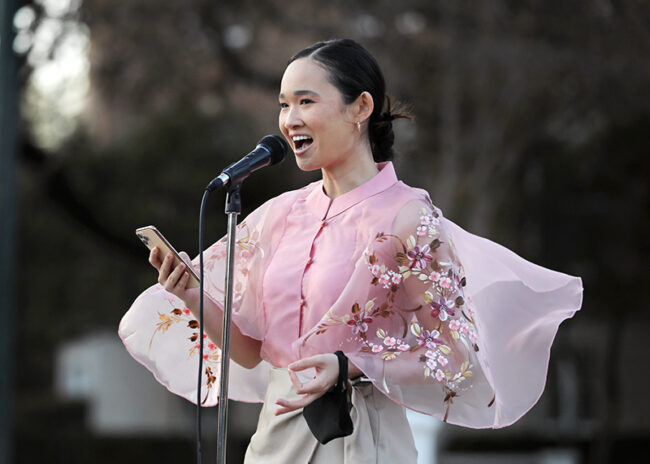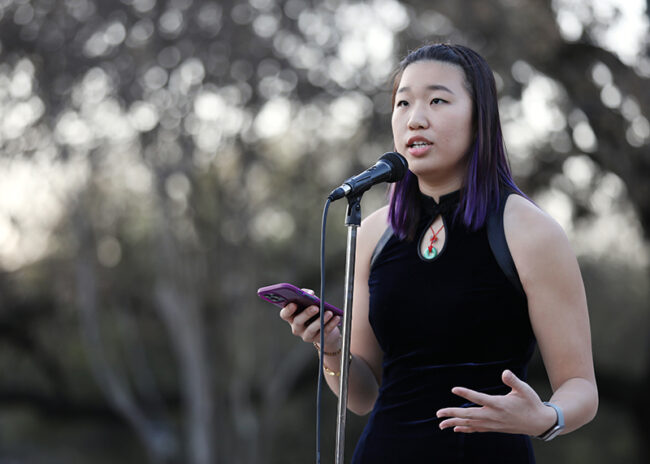Asian Council hosted an in-person and virtual vigil on Friday on Dallas Hall Lawn to honor the eight victims of last Tuesday’s Atlanta-area spa shooting and address the growing violence against the Asian American Pacific Islander (AAPI) community.
The vigil responded specifically to the killings of six Asian American women. SMU students spoke on this tragedy and their own experiences with racism as members of the AAPI community.
“When I first heard they were putting on this vigil, I was just happy to feel recognized by the campus community. It’s nice to see everyone come together and recognize what we’re going through and see it as a real problem,” junior Johanna Pang said. “This past year, I’ve been trying to reconcile with the Asian American experience in America—especially with the increase in hate crimes after COVID-19.”
Crimes against the Asian American and Pacific Islander (AAPI) community increased by nearly 150% following the spread of COVID-19 in the United States. The Atlanta-based shooting echoed this pattern of attacks on the AAPI community.
Asian Council members junior Hannah Sheard and junior Kaitlyn Lee started the vigil sharing anonymous stories of discrimination from SMU’s Asian American and Pacific Islander (AAPI) faculty and students. SMU Law student Averie Bishop spoke next, recounting receiving the Pfizer COVID-19 vaccine earlier that day and how the events on Tuesday affected her experience.

“What was meant to be a celebratory moment—an experience that symbolized a new beginning—was a harsh reminder of every violent hate crime our community has experienced this past year,” Bishop said. “I tried to make myself happy. I tried to smile. I tried to dig up the last ounce of manufactured positivity I could find within myself—just as the good and grateful model minority should—but nothing came.”
The model minority myth characterizes those of AAPI descent as polite, docile and high-achieving. Bishop emphasized harm the idea of this myth, describing the counterintuitive nature of the stereotype.
“In our community, we are taught to live in fear: to keep our heads down; to be grateful; to never ask questions,” Bishop said. “It is time for our community to start defining what it means to be AAPI rather than trying to assimilate and live in an illusion of the classic American story where we are not the main characters.”
Sophomore and Queer Senator Jo Lew spoke after Bishop, delivering a call to action for observers to step up against AAPI discrimination.
In their speech, Lew described overhearing employees in Fondren Library say, “all Chinese people should leave this campus because [they] were the problem, [they] were the ones who brought the virus.”
“Not all Asians play into the stereotype of doctors, engineers, lawyers, and families that come from long lines of money. This was not the reality for these women [in Atlanta], and it’s not my reality,” Lew said. “Discrimination against AAPI people is not new. It just took murder for us to speak up.”
Lew additionally spoke about the appropriation of Asian culture and the subsequent harm this type of attention generates. Lew gestured to SMU’s Vietnamese Student Association’s Cà Phê event, which ran from 5-7 p.m. before the vigil.
“You cannot like our culture, our entertainment, or our clothing or food without acknowledging the very people that they came from,” Lew said. “This comes from the people; it does not come out of thin air.”
Attendee sophomore Drishti Sachdeva detailed her experience as an Indian immigrant in relationship to the Atlanta shooting.
“I think model minorities and immigrants alike are told keep your head down: brush [racism] off, laugh it off,” Sachdeva said. “But when you’re standing in the face of something so blatantly racist and targeted, there is very little excuse to not do anything about it.”
First-year Lorien Alvar relayed feeling unsafe in a former place of opportunity.
“I come from a long line of Filipino immigrants, and I’m the first in my family to go to college; attending SMU is something that I consider a privilege,” Alvar said. “The reality of the Atlanta shooting is hard to face because I came to this country with the promise of getting a better education—living a better life—than my parents have experienced and proving to them that this is a land of dreams.”
The vigil ended with a recitation of the victims’ names, their personal stories and a moment of silence. Lee and Sheard offered observers further resources to educate themselves on AAPI discrimination on Asian Council’s Instagram and provided a GoFundMe to support the Atlanta shooting victims. 100% of the proceeds went to the Asian American Resource Foundation Inc.
“Asian Council is made of students who really care about the community—SMU should embrace this more: we have so much culture and so many leaders to offer,” Lee said. “They aren’t very visible, but they are the most dedicated leaders you’ll find on campus.”
Lee and Sheard closed out the vigil with a sobering call to change: “We didn’t have to wait until people were killed to take this seriously.”
“Many of our friends and families and teachers desire to go back to normal,” Bishop said. “But for us, normal is the very thing we wish to cure.”















